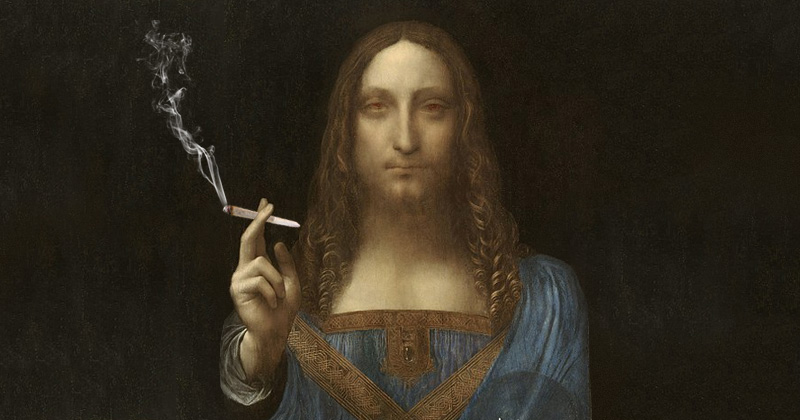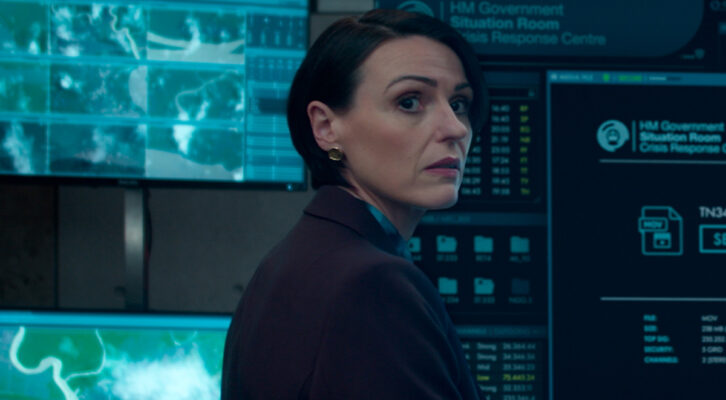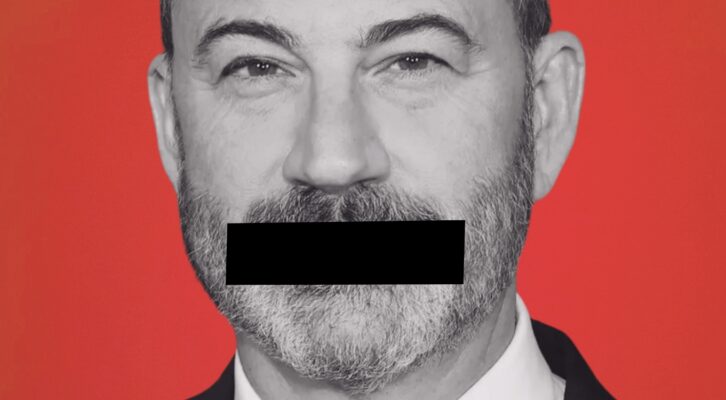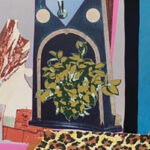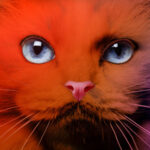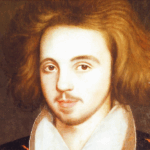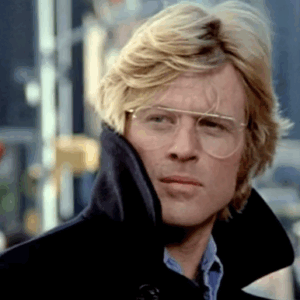My first apartment after college was a four-bedroom in San Francisco’s North Beach neighborhood that I shared with three guys. We were all in our early twenties, trying to make it on our own for the first time. I worked in PR; Brian worked in advertising; Ryan was an architect; and Chris was a consultant. I considered them all my drinking buddies, but, of the three, Chris seemed the most familiar to me, in that way a sister looks at her brother and sees her own image reflected back in a funny mirror.
One night, early in our friendship, Chris and I came home from the bar and bonded over the question of who was more Catholic. He went down to his room (the bedrooms were downstairs and the kitchen and living room were upstairs—a fleabag with a nice view from the top). When he returned, he produced a picture of Pope John Paul II. He told me to flip it over. The message on the back, in his mom’s handwriting, read, “For your Bible.”
I wonder if writers, who also happen to be Catholic, would be more humane if they could find some humor in their tradition.
Chris did not have a Bible. His life, as I understood it, was entirely secular. Furthermore, John Paul II was no longer pope when Chris received that picture. He had died earlier that year (2005) and Pope Benedict had taken over. But Benedict was no John Paul II, and sales of his image at Catholic novelty shops were probably sluggish.
Chris kept the picture, not because he loved his mother, though he did very much, but because he saw humor in her gesture. I looked up from the image of the pontiff in his white cassock and zucchetto, cracked a smile, and told Chris that he won: He was more Catholic.
I’m reminded of this moment whenever I hear John Mulaney speak about his time as an altar boy, or Conan O’Brien insist that he is Catholic “in his bones.” Or when Stephen Colbert talks about his enormous Catholic family. Of the three, Colbert is the only one still practicing, but they are all equally Catholic in their identities, and they frequently mine their childhoods and relationships with their families for jokes. I’m certain all three of them would have nodded knowingly if they were there that night in our grubby apartment, when Chris brought out the Pope’s picture.
But somehow, I’ve never found this particular identity, which translates so well to comedy, represented in literary fiction. To figure out why, I picked up the essay collection The Novel, Spirituality and Modern Culture. I was interested in Donna Tartt’s thoughts on being Catholic and a famous literary writer. For Tartt, writing and religion operate in separate registers, a perspective that is borne out in her work. She argues,
Writers are entertainers. Basically, we all lie for a living—and any novelist who feels too puffed up with the spiritual importance and nobility of his work would do well to consider whether he would not be serving humanity far better by opening up a soup kitchen or working among the homeless. But the play-acting and mischief of story-telling can also be a vehicle for getting in touch with the deepest and most serious spiritual truths—truths of fate and coincidence, or suffering and justice, of life and death.
Another essay in the collection, written by Sarah Maitland, is more exacting. After reading a review that concluded her work was “not a novel for atheists,” Maitland thought, “…what do you think we theists have been reading for the last 200 years? We have had to consume an unmitigated diet of post-Enlightenment bourgeois humanism, if we wish to read novels at all.” The issue, as Maitland states earlier in the essay, is that “There is seldom any mention, and never any examination, of people who are religious some of the time, or whose aspirations to faith are some part of a ‘whole’ life (which may also include adultery, divorce, questioning their sexuality, attending psychological counselling and the whole range of other activities that novels’ characters usually engage in).”
Maitland and Tartt both come from Christian traditions, but the collection, at least in title, is about spirituality and modern culture, generally, so it’s curious that they don’t address the elephant in the room, which is that there is something particular about Christianity that literary novelists avoid.
Fleishman is in Trouble explores casual Jewishness, what Taffy Brodesser-Akner describes as waking up and going to work as a Jewish person, without leaving Orthodoxy, or becoming Orthodox, or worrying about anti-Semitism. In other words, Brodesser-Akner wrote the kind of novel that Maitland seeks, with characters who are, “religious some of the time.” Dani Shapiro’s Signal Fires is a meditation on human connectedness that feels transcendental. In Martyr!, Kaveh Akbar manages to find God in a flickering light bulb. These authors include religious practice and philosophical musings without the embarrassment of their Catholic literary contemporaries. Perhaps this is because American Christian identity is defined by belief rather than inheritance. Or maybe American novelists avoid writing about Catholicism because people like Harrison Butker make it seem so lame?
Except, as Mulaney, O’Brien, and Colbert illustrate through their comedy—Catholic identity extends well beyond belief and practice. The delight of these Catholic comedians is that they don’t take their religion too seriously. John Mulaney’s father once told him he “has the moral backbone of an éclair.” Conan O’Brien’s mother couldn’t turn her neck, so when she backed out of the driveway, she performed the sign of the cross and gunned it. These jokes are funny because they are relatable but inconsequential. (Nobody was run over by the car.)
Along the way, we may brush against the sublime. And if not, Catholics can always ask for forgiveness later.
Muslim comedian Ramy Youssef has said that many of the people who relate to his humor are Catholics. In his stories, they see their conservative, religious parents, but they also share his need for spiritual fulfillment. Of course, this is the promise of every religious upbringing—laugh at your parents, but also, after a wild decade or two, return in some way, maybe not to the religion, but to the spiritual void that the religion was meant to fill in the first place.
The most iconic Catholic joke of all time came from Saint Augustine when he said, “Lord give me chastity but not yet…” which echoed when a young John Mulaney told Stephen Colbert that the biggest bummer of getting confirmed into the Catholic Church (other than the fact that he didn’t get to do the electric slide and receive bags of money at a Bar Mitzvah) was that he had to renounce Satan right before high school when he would “need him the most.”
Writing through the perspective of young people offers an opportunity to look at the idiosyncrasies and hypocrisies of religious inheritance with a light touch. In my novel Fine Young People, the seventeen-year-old narrator is trying to explain the Holy Spirit to her Hindu best friend, and she says it’s when you feel God in your gut. Then she jokes it might just be indigestion.
This dialogue sprouted from an idea given to me by a priest: Catholics don’t understand the Holy Spirit. I grew up saying the Glory Be with my father every night before bed, but I can’t explain the Holy Spirit. I also don’t understand why Job had to suffer, or why Lot’s wife was turned to stone for looking back at her burning city, or why life exists on earth. I’m not, after all, a theologian. I’m a novelist.
I wonder if writers, who also happen to be Catholic, would be more humane if they could find some humor in their tradition. If one doesn’t take herself too seriously, there is the possibility that spirituality is not the flattening of the playful devils that are so beguiling in literary fiction, but the opportunity to mine them. Along the way, we may brush against the sublime. And if not, Catholics can always ask for forgiveness later.
__________________________________
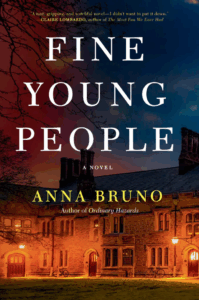
Fine Young People by Anna Bruno is available from Algonquin Books, an imprint of Hachette Book Group.

